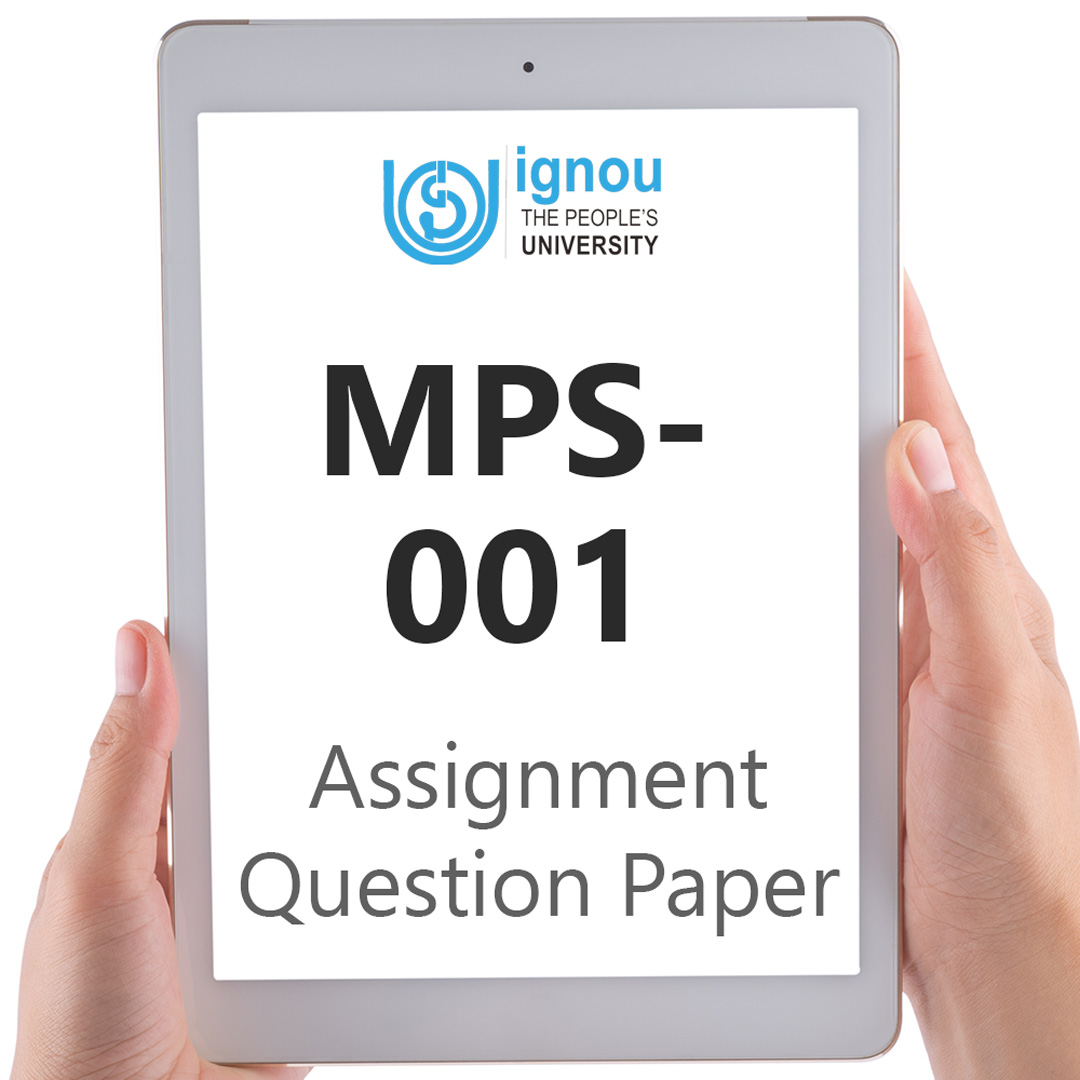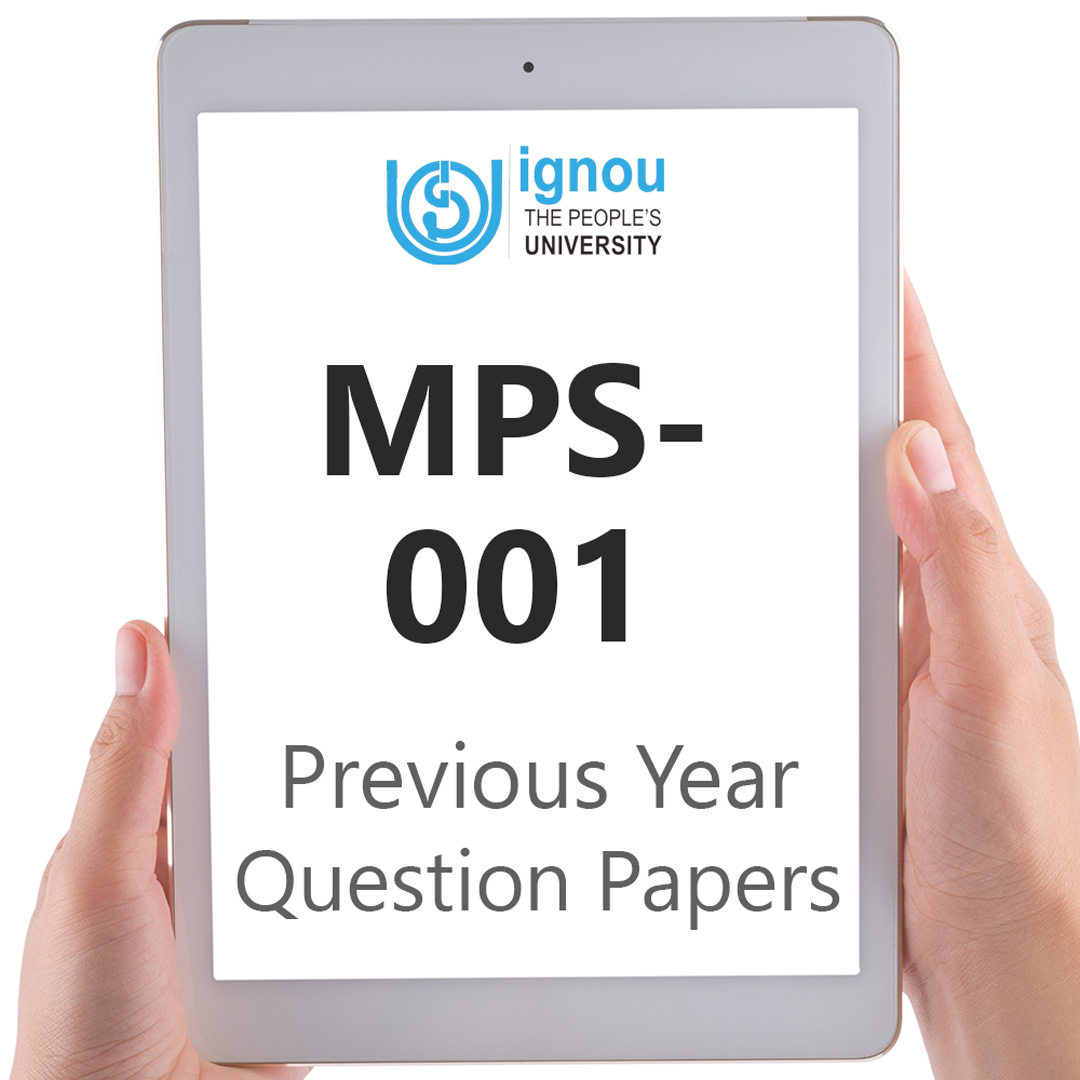If you are looking for MPS-001 IGNOU Solved Assignment solution for the subject Political Theory, you have come to the right place. MPS-001 solution on this page applies to 2022-23 session students studying in MPS courses of IGNOU.
MPS-001 Solved Assignment Solution by Gyaniversity
Assignment Code: MPS-001/Asst/TMA/2022-23
Course Code: MPS-001
Assignment Name: Political Theory
Year: 2022-2023
Verification Status: Verified by Professor
SECTION-I
1 Discuss negative liberty.
Ans) The 1958 book "Two Concepts of Liberty" by Isaiah Berlin remains the standard defence of negative liberty. Berlin defined "being free" as "not having outside interference." The greater the non-interference zone, the greater my independence. This description harkens back to Hobbes' description of liberty as the lack of "external obstructions" in The Leviathan. "A free man is he, that in those things, which he by his strength and wit he is able to achieve, is not hampered to do what he has a will to," according to Hobbes.
The rules of the sovereign, adopted after civil society had been established by the social contract, were among these obstacles in Hobbes' opinion because liberty depended on the "silence of the law." The lack of civil laws in the state of nature should have given its inhabitants more freedom, but because of their absence, each person served as an obstruction to another's freedom of activity. The sovereign protected his subjects from one another's interference through his laws.
It is important to remember that Hobbes, one of the first proponents of negative liberty, found no conflict between the freedom of his subjects and the "necessary" regulations of an absolute monarch. It was irrelevant to determine if a person had any influence over the laws that applied to her in order to determine whether she was free. The laws were only created by the absolute ruler. It was important to determine whether the sovereign left as much of her life ungoverned by his laws as feasible. Berlin makes the same point: "There is no necessary connection between individual liberty and democratic governance. Liberty in its negative connotation is principally concerned with the area of control, not with its source. The response to "Who governs me?" is logically distinct from "How much does government intervene in my life?"
Hobbes made a distinction between freedom and ability when explaining the concept of liberty: "But when the impediment of motion, is in the constitution of the thing itself, we cannot say, it wants the Liberty, but the Power to move; as when a stone lies still, or a man is fastened to his bed by illness." This contrast between power or capacity and liberty is echoed by the majority of proponents of negative liberty. They disagree on when a condition should be characterised as a lack of capacity and when it should be characterised as a lack of liberty.
In the instance of humans, not being able to fly due to a lack of wings is clearly a case of a lack of ability rather than being bound to a place. According to Berlin, given a social theory in which this poverty is the result of "other humans having made arrangements" whereby some men lack material resources while others enjoy an abundance of them, the poor man should be described as being unfree to do so rather than as being unable to buy bread:
The role that I believe other people have played, directly or indirectly, with or without intending to do so, in thwarting my desires, is the criterion of tyranny. This is undoubtedly a great cry from Hillel Steiner's theories, according to which only blatantly physical restraints on someone's freedom can be used to support that assertion. So, even among those who support negative liberty, there is a considerable variation in how people define obstructions and hurdles to activity.
2. What is equality? Explain.
Ans) All are equal in the eyes of God is a popular expression of the first sort of equality, or equality of humans, found in cultural, theological, and moral traditions. Men must be treated equally in all respects because of something known as "human nature," "human dignity," "personality," or "soul." This issue relates to the equality of men as men. Marxism's concept of the "human essence," which is used to describe this kind of equality, is contemporary. According to the Marxist school of thought, all humans are rational, aware, and practical agents who are characterised by their practise.
According to this statement, "man is by nature a universal free being who shapes himself through his own personal action toward an ever expanding mastery of nature and an ever more global intercourse, autonomy and consciousness." Additionally, socialism and Christianity were frequently mixed by authors like R.H. Tawney to provide a religious basis for a dedication to social equality. On the basis of the idea of socio-economic equality, the welfare state of today does not prioritise this type of equality.
The second definition of equality is linked to the most popular justification for equality, which is "equality of opportunity." This implies that everyone should have equal access to significant social institutions on a universalistic basis, particularly based on talent and success. In the establishment of contemporary educational institutions, where promotion and accomplishment are theoretically based on intelligence, skill, and talent independent of parental and social background, the discussion of equality of opportunity has been particularly significant. This kind of equality adheres to the meritocracy theory, according to which a society's occupational structure is filled based on attainment of universally accepted standards rather than factors such as age, sex, income, caste, or religion.
Thirdly, the idea of equality of opportunity is linked to and combined with the idea of equality of conditions in several ways. Equal opportunity is given to those with the aptitude and willingness to use it for their own advancement in a competitive environment. The starting position for accomplishment is unequal, though, when parents can pass on advantages to their offspring. For instance, children from working-class families would start with disadvantages they have inherited from their parents. It is crucial to ensure equality of condition, which means that all participants in the race should start at the same location with the right handicaps, in order for equality of opportunity to have any meaningful content.
Fourth, equality of results or outcome is the most radical interpretation of equality. It basically means that, regardless of starting place or innate talent, equality of results is attained through legislation and other political means. Inequalities at the start of a programme for equal results would be changed into social equality at the end. Social programmes of positive discrimination in favour of the underprivileged (i.e., women, children, handicapped, scheduled castes, scheduled tribes, etc.) are intended to make up for a significant inequality of circumstances in order to create a meaningful equality of opportunity to ensure equality of outcomes.
Therefore, we must bear in mind the various definitions of equality in order to comprehend what equality means. While historically the liberal democratic tradition has favoured the idea of equality of opportunity and conditions, the socialist platform of policies aimed at redressing the disparities caused by competition and the market place has included equality of outcome.
SECTION-II
Write a short note on the following in about 250 words each.
3. (a) Classical Liberalism
Ans) The free market and laissez-faire economics are supported by classical liberalism, a political tradition and subset of liberalism that places special emphasis on individual autonomy, limited government, economic freedom, political freedom, and freedom of speech. It also supports civil liberties under the rule of law. Building on concepts that date back at least to the 13th century in the Iberian, Anglo-Saxon, and central European cultures, it reached its full bloom in the early 18th century and served as the basis for both the American Revolution and the broader "American Project."
Famous liberal thinkers who contributed to classical liberalism include David Ricardo, Thomas Malthus, Jean-Baptiste Say, and John Locke. It drew inspiration from classical economics, particularly from Adam Smith's theories in Book One of The Wealth of Nations, as well as from a belief in natural law, progress, and utilitarianism. The most well-known proponents of classical liberalism today are thought to be Friedrich Hayek, Milton Friedman, Ludwig von Mises, Thomas Sowell, George Stigler, and Larry Arnhart.
Classical liberalism favours deregulation and views social policies, taxes, and the role of the state in people's lives more unfavourably than other liberal subfields like social liberalism. It was referred to as economic liberalism prior to the Great Depression and the advent of social liberalism. The word "classical liberalism" was used in retronym to separate social liberalism from the previous 19th-century liberalism. According to contemporary standards, simple liberalism in the United States frequently refers to social liberalism, whereas in Europe and Australia, simple liberalism frequently refers to classical liberalism.
(b) Liberal democratic welfare state
Ans) The democratic welfare state started to be associated with positive liberalism in the 20th century. In terms of the scope of public policy, the nature of state action, the fundamental presumptions about human nature, and the notion of social good, the welfare state represents a significant shift of the capitalist laissez-faire state of the nineteenth century. In order to preserve the core elements of the capitalism system while simultaneously eradicating its effects, the welfare state sought to balance the interests of the individual with those of society.
The goal of the state is to uphold law, order, and justice, but it also plays a role in the social process by acting in the interests of the community and providing services that promote the wellbeing of all citizens. The welfare state's fundamental tenets are straightforward. First, the understanding that every community member has a right to a minimal level of living simply because he or she is a human being. Second, the welfare state is dedicated to a policy of economic stability and advancement. Whenever private enterprise is unable to address the threat of economic instability or decline on its own, the welfare state seeks to end the cycles of violent booms and busts in the economy through public policies. Thirdly, full employment is a primary priority for the welfare state in terms of public policy.
The Great Depression of the 1930s demonstrated not just the negative effects of unemployment on the economy but also the degradation of people who, although being able and eager to work, were unable to obtain employment due to circumstances beyond their control. Welfare state proponents contend that full employment policies may strengthen and protect free enterprise without resorting to nationalization's excesses. Fiscal policies created to redistribute purchasing power in harmony with the best interests of the country, investment incentives to private business in times of slack public works for direct unemployment relief, government credits to builders or buyers of homes—these are but a few of the measures that can be taken to ensure that taxes are appropriately adjusted to periods of prosperity and depression.
4. (a) Conservatism
Ans) Conservatism, political doctrine that emphasizes the value of traditional institutions and practices. Conservatism is a preference for the historically inherited rather than the abstract and ideal. This preference has traditionally rested on an organic conception of society—that is, on the belief that society is not merely a loose collection of individuals but a living organism comprising closely connected, interdependent members. Conservatives thus favour institutions and practices that have evolved gradually and are manifestations of continuity and stability. Government’s responsibility is to be the servant, not the master, of existing ways of life, and politicians must therefore resist the temptation to transform society and politics.
This suspicion of government activism distinguishes conservatism not only from radical forms of political thought but also from liberalism, which is a modernizing, anti-traditionalist movement dedicated to correcting the evils and abuses resulting from the misuse of social and political power.
In The Devil’s Dictionary, the American writer Ambrose Bierce cynically defined the conservative as “a statesman who is enamoured of existing evils, as distinguished from the Liberal, who wishes to replace them with others.” Conservatism must also be distinguished from the reactionary outlook, which favours the restoration of a previous, and usually outmoded, political or social order. The term conservative was introduced after 1815 by supporters of the newly restored Bourbon monarchy in France, including the author and diplomat Franƈois-Auguste-René, vicomte de Chateaubriand. In 1830 the British politician and writer John Wilson Croker used the term to describe the British Tory Party, and John C. Calhoun, an ardent defender of states’ rights in the United States, adopted it soon afterward.
(b) Fundamentalism
Ans) Fundamentalism is defined as a tendency among certain groups – more often, but not being exclusively – in religious terms, to follow certain specific scriptures, dogmas or ideologies strictly and literally with a strong importance of maintaining ingroup and outgroup distinctions. Fundamentalists emphasize on purity and have a strong desire to return to previous ideals which they believe its members have strayed from.
Rejection of diversity of opinion as applied to these established “fundamentals” and their accepted interpretation within the group often results from this tendency. Entirely depending on the context at hand “fundamentalism” is a pejorative term rather than being a neutral characterization. It comes with a set of its own negative connotations that its own adherents will hesitate to associate with.
The origin concept of “fundamentalism” was found in a set of four-volume books published in 1909 – “The Fundamentals”. Published by the Bible Institute of Los Angeles (Now the Biola University) between 1909 and 1920, these books appealed to Christian to affirm certain fundamental doctrines in Christianity. It would come to represent the “Fundamentalist Modernist controversy” that would rage in the late 19th century within the Protestant churches of the United states and continued through the 1920s.
Soon it came to be associated with a particular segment of evangelical Protestantism, who set themselves apart from the separatist approach towards modernity and towards other Christians who would not agree with their views. It would also apply to other religious groups both within and without, who would stick to only certain beliefs while completely disregarding other views.
5. (a) Nationalism
Ans) Nationalism is the idea that your nation, often identified by a shared ethnicity or set of values, is better than all other nations. Nationalism can be—and oftentimes is—expressed as aggression toward other nations. Nationalism is built around a shared language, religion, culture, or set of social values. A nation will emphasize shared symbols, folklore, and mythology. Nationalism can impact foreign and domestic political policies and typically has economic implications. A nationalist is someone who believes their nation is better than all others. Nationalist politicians have gained favour across parts of the world in recent years.
Examples of nationalism in the 21st century are spread across the globe. In 2014, India elected Hindu nationalist Narendra Modi. In 2015, Vladimir Putin rallied Russians to invade Ukraine to "save" ethnic Russians. In 2016, the United Kingdom voted in favour of Brexit, the British exit from the EU. Closer to home, the United States elected populist Donald Trump to the presidency in 2016. In 2018, President Trump declared at a Texas rally that he was a nationalist, though many felt that was already evident from his protectionist policies. He and his former advisor Steve Bannon had often advocated for economic nationalism.
Nationalists demand to be independent of other countries. They don't join global organizations or collaborate with other countries on joint efforts. If the people are part of another nation, then they will want freedom and their own state. Because they believe in the superiority of their shared attribute, nationalists often stereotype different ethnic, religious, or cultural groups. The resultant prejudice keeps their nation unified. Intolerance can lead to a desire to rid the country of those deemed as "different." In an extreme form, it can lead to ethnic cleansing and genocide.
(b) Multiculturalism
Ans) Multiculturalism, the view that cultures, races, and ethnicities, particularly those of minority groups, deserve special acknowledgment of their differences within a dominant political culture.
That acknowledgment can take the forms of recognition of contributions to the cultural life of the political community as a whole, a demand for special protection under the law for certain cultural groups, or autonomous rights of governance for certain cultures. Multiculturalism is both a response to the fact of cultural pluralism in modern democracies and a way of compensating cultural groups for past exclusion, discrimination, and oppression.
Most modern democracies comprise members with diverse cultural viewpoints, practices, and contributions. Many minority cultural groups have experienced exclusion or the denigration of their contributions and identities in the past. Multiculturalism seeks the inclusion of the views and contributions of diverse members of society while maintaining respect for their differences and withholding the demand for their assimilation into the dominant culture.
Multiculturalism stands as a challenge to liberal democracy. In liberal democracies, all citizens should be treated equally under the law by abstracting the common identity of “citizen” from the real social, cultural, political, and economic positions and identities of real members of society. That leads to a tendency to homogenize the collective of citizens and assume a common political culture that all participate in.
However, that abstract view ignores other politically salient features of the identities of political subjects that exceed the category of citizen, such as race, religion, class, and sex. Although claiming the formal equality of citizens, the liberal democratic view tends to underemphasize ways in which citizens are not in fact equal in society.
Rather than embracing the traditional liberal image of the melting pot into which people of different cultures are assimilated into a unified national culture, multiculturalism generally holds the image of a tossed salad to be more appropriate. Although being an integral and recognizable part of the whole, diverse members of society can maintain their particular identities while residing in the collective.





